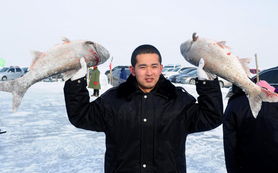Article:
Winter fishing can be a challenging but rewarding experience for anglers. The cold weather often brings a sense of solitude and tranquility to the water, allowing anglers to connect with nature in a unique way. However, the cold temperatures can also make fishing more difficult, especially when it comes to casting. In this article, we will discuss some valuable techniques to help you master winter fishing and achieve success with your rod casting.
Dress Appropriately
The first step to successful winter fishing is to dress warmly. Cold weather can cause discomfort and affect your casting ability. Wear layers of thermal clothing, including a moisture-wicking base layer, an insulating layer, and a waterproof outer layer. Don't forget to protect your extremities with gloves, a hat, and a scarf. Proper attire will keep you warm and focused on your fishing techniques.
Maintain Rod Flexibility
Cold weather can make fishing rods more brittle and less flexible. To prevent any damage, it's essential to maintain your rod's flexibility. Before heading out to the water, warm your rod by holding it in your hands for a few minutes. This will help prevent any potential breaks or cracks during casting. Additionally, ensure that your reel is properly lubricated to reduce friction and prevent any sticking issues.
Adjust Casting Techniques
Winter fishing requires a different approach to casting than fishing in warmer months. Here are some tips to help you adapt your casting techniques:
a. Use a Shorter Casting Distance: The shorter the casting distance, the less time your lure will be in the air. This reduces the chances of it getting snagged on underwater obstacles. Aim for casting distances of 10-15 feet.
b. Keep a Low Angle: A low casting angle will help you avoid snags and reduce the risk of losing your lure. Angle your rod slightly downward and cast in a smooth, controlled motion.
c. Use a Soft Touch: In cold weather, it's essential to be gentle with your casting. Avoid throwing your lure with too much force, as this can cause it to skip or bounce off the water's surface. Instead, use a soft touch and allow the lure to gently land on the water.
d. Practice Casting in Short Bursts: To conserve energy and stay warm, it's a good idea to practice casting in short bursts. Cast for a few minutes, then take a break to warm up and reposition yourself.
Choose the Right Lure
During winter, fish are less active and often feed on slower-moving prey. To attract their attention, use lures that mimic the natural movement of insects, minnows, or other small aquatic creatures. Here are some popular winter fishing lures:
a. Jigs: Jigs are versatile lures that can be used in various conditions. They are particularly effective for targeting fish that are holding in deeper water.
b. Spinnerbaits: Spinnerbaits create a lot of movement and noise, which can attract fish in cold water. Use slower retrieves and experiment with different colors and blade sizes.
c. Soft Plastic Worms: Soft plastic worms are an excellent choice for slow presentations. Rig them on a straight or curved hook and work them through the weeds or along the bottom.
Find the Right Spot
During winter, fish tend to move to deeper, warmer water. Look for areas with structure, such as rocks, logs, or brush piles, as these spots can provide cover and warmth for fish. Additionally, consider fishing around bridges, culverts, or other man-made structures that can hold fish during the cold months.

Be Patient and Observant
Winter fishing can be a slow process, so it's essential to be patient and observant. Pay attention to the water's surface, as fish may be feeding at the surface or near the bottom. Adjust your techniques based on the fish's behavior and the weather conditions.
In conclusion, mastering winter fishing and achieving success with your rod casting requires adapting to the cold weather conditions and employing different techniques. By dressing appropriately, maintaining rod flexibility, adjusting your casting methods, choosing the right lure, finding the right spot, and being patient, you'll be well on your way to a successful winter fishing experience. So, bundle up, grab your gear, and head out to the water to enjoy the beauty and tranquility of winter fishing.












